#in the dream house
Explore tagged Tumblr posts
Text
In her essay “Venus in Two Acts,” on the dearth of contemporaneous African accounts of slavery, Saidiya Hartman talks about the “violence of the archive.” This concept—also called “archival silence”—illustrates a difficult truth: sometimes stories are destroyed, and sometimes they are never uttered in the first place; either way something very large is irrevocably missing from our collective histories.
The word archive, Jacques Derrida tells us, comes from the ancient Greek ἀρχεῖον: arkheion, “the house of the ruler.” When I first learned about this etymology, I was taken with the use of house (a lover of haunted house stories, I’m a sucker for architecture metaphors), but it is the power, the authority, that is the most telling element. What is placed in or left out of the archive is a political act, dictated by the archivist and the political context in which she lives. This is true whether it’s a parent deciding what’s worth recording of a child’s early life or—like Europe and its Stolpersteine, its “stumbling blocks”—a continent publicly reckoning with its past. Here is where Sebastian took his first fat-footed baby steps; here is the house where Judith was living when we took her to her death.
Sometimes the proof is never committed to the archive—it is not considered important enough to record, or if it is, not important enough to preserve. Sometimes there is a deliberate act of destruction: consider the more explicit letters between Eleanor Roosevelt and Lorena Hickok, burned by Hickok for their lack of discretion. Almost certainly erotic and gay as hell, especially considering what wasn’t burned. (“I’m getting so hungry to see you.”)
The late queer theorist José Esteban Muñoz pointed out that “queerness has an especially vexed relationship to evidence…. When the historian of queer experience attempts to document a queer past, there is often a gatekeeper, representing a straight present.” What gets left behind? Gaps where people never see themselves or find information about themselves. Holes that make it impossible to give oneself a context. Crevices people fall into. Impenetrable silence.
[...] Consider: What is the topography of these holes? Where do the lacunae live? How do we move toward wholeness? How do we do right by the wronged people of the past without physical evidence of their suffering? How do we direct our record-keeping toward justice?
The memoir is, at its core, an act of resurrection. Memoirists re-create the past, reconstruct dialogue. They summon meaning from events that have long been dormant. They braid the clays of memory and essay and fact and perception together, smash them into a ball, roll them flat. They manipulate time; resuscitate the dead. They put themselves, and others, into necessary context.
In The Dream House, Carmen Maria Machado
147 notes
·
View notes
Text

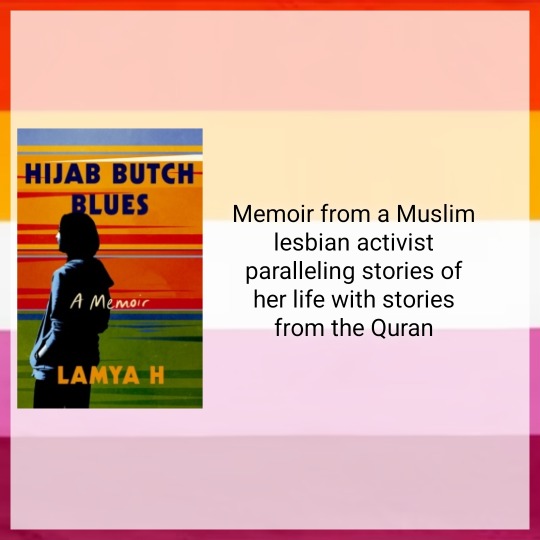




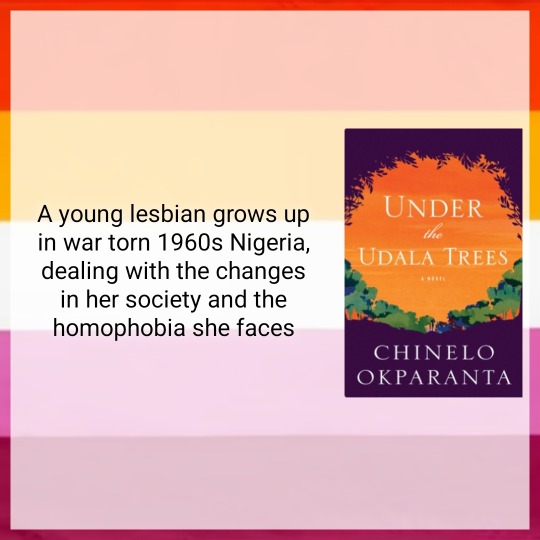
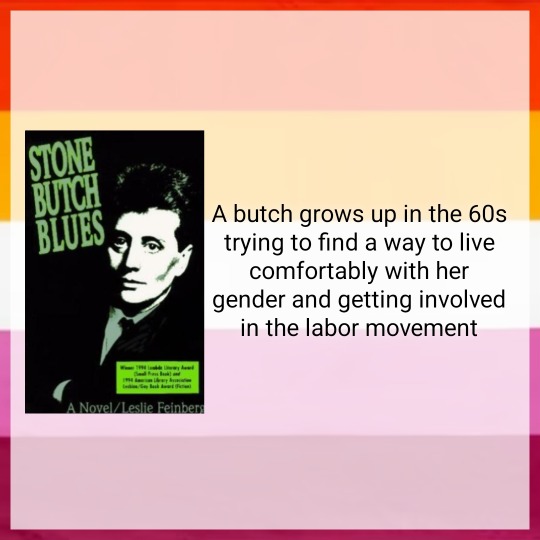
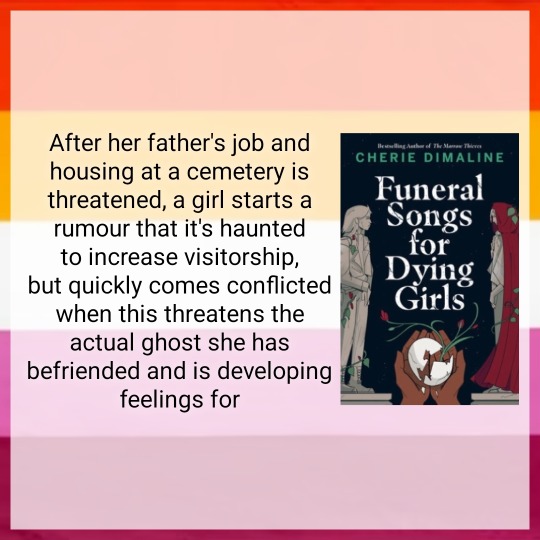

This does come with the caveat that I can't quite remember if the characters in How to Find a Princess, Funeral Songs for Dying Girls, and Chain-Gang All-Stars identity specifically as lesbians or not, but they are all sapphic. Full titles under the cut!
EDIT: Apparently Alice Walker is a big proponent of a famous antisemitic conspiracy theorist, David Icke, so be aware of that when considering The Color Purple
Happy Lesbian Visibility Week! 📚📖🏳️🌈
Hijab Butch Blues by Lamya H
In the Dream House by Carmen Maria Machado
How to Find a Princess by Alyssa Cole
Cantoras by Carolina De Robertis
The Color Purple by Alice Walker
Under the Udala Trees by Chinelo Okparanta
Stone Butch Blues by Leslie Feinberg
Funeral Songs for Dying Girls by Cherie Dimaline
Chain-Gang All-Stars by Nana Kwame Adjei-Brenyah
#lesbian#lesbian reads#lesbian books#lesbian lit#queer books#queer reads#queer lit#lesbian visibility week#bookblr#hijab butch blues#in the dream house#how to find a princess#cantoras#the color purple#stone butch blues#funeral songs for dying girls#chain gang all stars
413 notes
·
View notes
Text
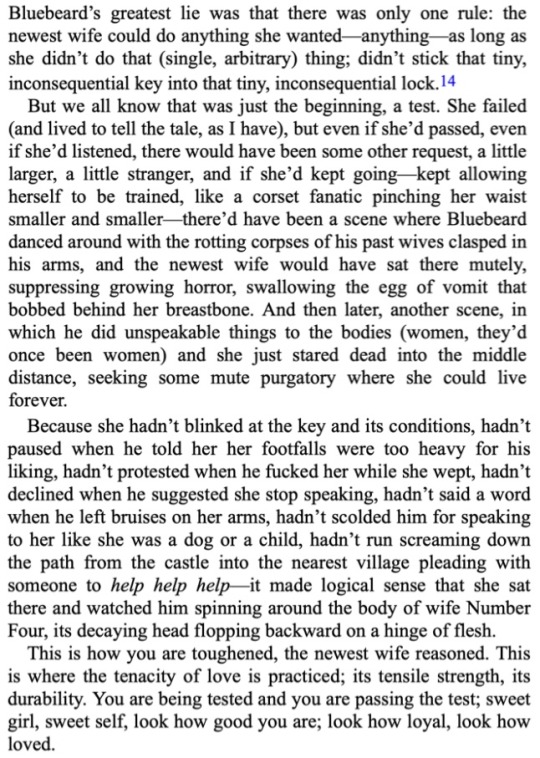
- Carmen Maria Machado, In the Dream House
715 notes
·
View notes
Text

in the dream house - carmen maria machado
271 notes
·
View notes
Text

loved in the dream house so much i ended up getting her body and other parties too!
#bookblr#books and reading#books#booklr#reading#book aesthetic#in the dream house#carmen maria machado#horror books#anthology#memoir#queer memoir#her body and other parties
117 notes
·
View notes
Text
god okay so this quote by carmen maria machado from her memoir in the dream house -
“I had a room to myself as a kid, but my mother was always quick to point out that it wasn’t my room, it was her room and I was merely permitted to occupy it. Her point, of course, was that my parents had earned everything and I was merely borrowing the space, and while this is technically true I cannot help but marvel at the singular damage of this dark idea: That my existence as a child was a kind of debt and nothing, no matter how small, was mine. That no space was truly private; anything of mine could be forfeited at someone else’s whim."
- got me thinking about house likely not feeling ownership in his own home as a kid due to his dad's discipline methods, and the way he clings to his spaces as an adult (aka his apartment and his office)
and THEN it got me thinking about house getting kicked out of his and wilson's shared apartment in late season 6.
imagine, if you will. you're a kid with an abusive military father who makes it clear that you don't actually own anything and that you will only ever be a guest in his house. your father regularly takes away the roof over your head as a form of discipline. your father regularly violates your bodily autonomy by forcing you to take ice baths. your father's job means you spend your childhood moving from place to place without you having any say in the matter. your father shows you that even the food you eat is not an inherent right but a generous gift, and it can and will be taken away if you're late to the table.





so you grow up, and your spaces are really important to you. you stay in the same apartment and have the same office for years and years and you make both of them feel truly yours. they belong to you. no one can take them away from you anymore.
and then you make changes, painful ones. it's horrible and difficult and terrifying but it's worth it. and then your best friend offers you a new home, a space for you to share. together, the two of you make it yours. you live in a place that is owned by your best friend but it's nothing like living in the places owned by your dad. it's safe here. there's love here. this home belongs to both of you.


and then your best friend reconnects with his ex, and you're relegated to second place like you always are when there's a woman in his life, and he asks you to leave.



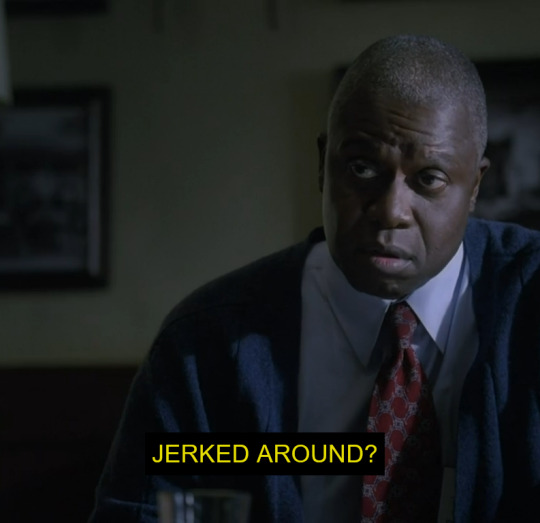
and you realize you had forgotten what it's like to be reminded that your home was never truly yours.

#swimming in the greg house childhood trauma swamp again#hilson#house md#late season 6 fucks me UP#john house#carmen maria machado#in the dream house#house season 6#op
59 notes
·
View notes
Text





from In the Dream House by Carmen Maria Machado (2019)
In Dorothy Allison’s short story “Violence Against Women Begins at Home,” a group of lesbian friends gathers for a drink and they discuss a bit of community gossip: a pair of women recently broke into another woman’s house and trashed it, smashing glass and dishes and destroying her art, which they deemed pornographic. They spray-painted the story’s eponymous phrase on her wall. The friends debate police involvement and intragroup conflict mediation; but toward the end of the story, as they are parting ways, the problem crystallizes into a single, telling exchange:
“Look, do you think maybe we could hold a rent party for Jackie, get her some money to fix her place back up?”
Paula looks impatient and starts gathering up her stuff. “Oh, I don’t think we should do that. Not while they’re still in arbitration. And anyway, we have so many important things we have to raise money for this spring—community things.”
“Jackie’s a part of the community,” I hear myself say.
“Well, of course.” Paula stands up. “We all are.” The look she gives me makes me wonder if she really believes that, but she’s gone before I can say anything else.
Queer folks fail each other too. This seems like an obvious thing to say; it is not, for example, a surprise to nonwhite queers or trans queers that intracommunity loyalty goes only so far, especially when it must confront the hegemony of the state. But even within ostensibly parallel power dynamics, the desire to save face, to present a narrative of uniform morality, can defeat every other interest.
The queer community has long used the rhetoric of gender roles as a way of absolving queer women from responsibility for domestic abuse. Which is not to say that activists and academics didn’t try. When the conversation about queer domestic abuse took hold in the early 1980s, activists gave out fact sheets at conferences and festivals to dispel myths about queer abuse. [see footnote 45] Scholars distributed questionnaires to get a sense of the scope of the problem. [see footnote 46] Fierce debates were waged in the pages of queer periodicals.
But some lesbians tried to restrict the definition of abuse to men’s actions. Butches might abuse their femmes, but only because of their adopted masculinity. Abusers were using “male privilege.” (To borrow lesbian critic Andrea Long Chu’s phrase, they were guilty of “[smuggling patriarchy] into lesbian utopia.”) Some argued that consensual S&M was part of the problem. Women who were women did not abuse their girlfriends; proper lesbians would never do such a thing. [see footnote 47] There was also the narrative that it was, simply, complicated. The burden of the pressure of straight society! Lesbians abuse each other!
Many people argued that the issue needed to be handled within their own communities. Ink was spilled in the service of decentering victims, and abusers often operated with impunity. In an early lesbian domestic abuse trial, a lawyer noted the odd and unsettling detail that most of the time the jury spent behind closed doors was—contrary to what she’d been worried about—the straight jurors attempting to convince the jury’s sole lesbian member of the defendant’s guilt. When she was later questioned, the lesbian juror told the lawyer that she hadn’t “wanted to convict a [queer] sister,” as though the abused girlfriend was not herself a fellow queer woman.
Around and around they went, circling essential truths that no one wanted to look at directly, as if they were the sun: Women could abuse other women. Women have abused other women. And queers needed to take this issue seriously, because no one else would.
footnote 45: Among the myths tackled by the Santa Cruz Women’s Self Defense Teaching Cooperative: “Myth: It’s only emotional/psychological, so that doesn’t count.” “Myth: I can handle it—unlike her last three lovers.” “Myth: Staying together and working it out is most important.” “Myth: We’re in therapy, so it’ll get fixed now.”
footnote 46: Actual questionnaire language by researcher Alice J. McKinzie: “Is your abuser present at this festival? If your abuser is at this festival, is she present while you are filling this out? If your abuser is not present while you are filling this out, is she aware that you are filling out this questionnaire? If you answered NO to the question above … do you plan to tell her later?”
footnote 47: This No True Scotsman fallacy could bend these narratives in every direction conceivable; create a kind of moving goalpost that permitted an endless warping of accountability. In a firsthand account of her abuse in Gay Community News in 1988, a survivor wrote: “I had been around lesbians since I was a teenager, and although some of them had troubled relationships, I was unaware of any battering. I attached myself to the comforting myth that lesbians don’t batter. Much later, when I was ‘out’ enough to go to gay bars in a town that was liberal enough to tolerate them, I saw that some lesbians did indeed batter. However, I thought they were all of a type—drunks, sexist butches or apolitical lesbians—so I decided that feminist lesbians don’t batter.” Activist Ann Russo put it more succinctly in her book Taking Back Our Lives: “I had found it hard to name abuse in lesbian relationships as a political issue with structural roots.”
#carmen maria machado#in the dream house#quotes#dorothy allison#intimate partner violence#domestic violence#domestic abuse#queer abuse#abusive relationship#image described#mac’s bookshelf
135 notes
·
View notes
Text
My Favorite Books I Read in 2023
I read a ton of good novels last year- 36 in all (and uh, 78 manga/graphic novels, but we'll examine that in another post). Here's a link to my Goodreads year in books (the manga is at the beginning, the novels start with Siren Queen) and my storygraph wrap up.
I reread a ton of Discworld this year, and it's as spectacular as ever. But what about new reads?
Well, here are my favorite books I read in 2023!
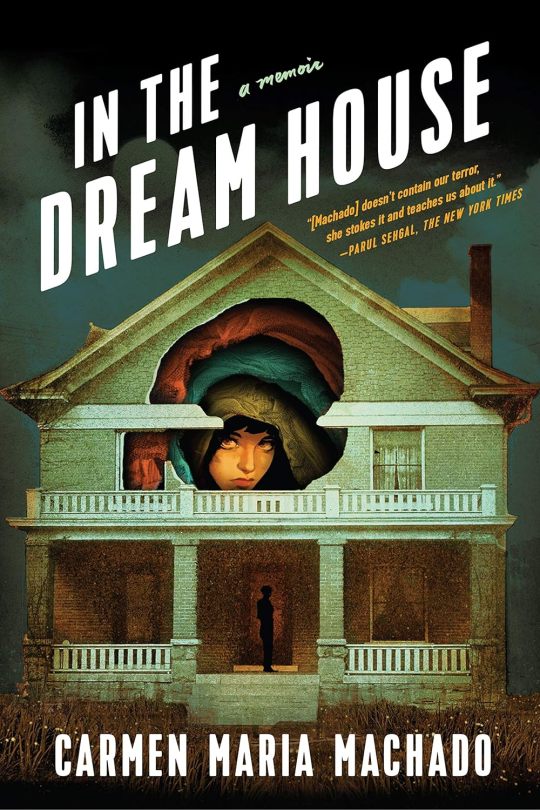
In the Dream House by Carmen Maria Machado
This is an autobiographical memoir about the abusive relationship the author went through with her ex-girlfriend. It's absolutely gut-wrenching, and at times, achingly beautiful. Machado uses the house she shared with her girlfriend, which she calls the "dream house", as a back drop. It's a place she always wanted and also a place she became trapped in, Machado's language is beautiful as she explores the relationship from different lenses-- The Dream House as Lesbian Cult Classic, the Dream House as Noir, the Dream House as Creature Feature, the Dream House as Stoner Comedy....All facets of the relationship are explored in a way that grips you by the throat and makes you remember everyone who ever tried to suffocate you-- but it also explores the hard work of moving on, of picking up the pieces, of living and embracing tenderness along with hardship.
I especially related to Machado's struggle to talk about abuse between queer lovers because of her fears of giving homophobes more ammunition...and when she says "we deserve to have our wrongdoing represented as much as our heroism, because when we refuse wrongdoing as a possibility for a group of people, we refuse their humanity", I felt that deeply.
This wasn't just one of my favorite books this year, it goes on the list of all-time favorite books. I wish I had this kind of writing style. I'll be returning to this again and again.
Zachary Ying and the Dragon Emperor by Xiran Jay Zhao
A middle-grade novel about a Chinese-American teen who feels a bit alienated from his heritage, which becomes a bit of an issue once he finds out the First Emperor of China has possessed his A.R. Gaming Headset. Now he needs to close a portal to the underworld with the help of other kids possessed by emporers.
This was a whole lot of fun, and often quite poignant. I was unsure if I could really enjoy middle-grade books as an adult, and this absolutely proves I can. There's a lot of really interesting Chinese history blended with action-packed fantasy, and exploration of the complicated feelings a kid can have about their own heritage . The dynamic between Zachary and Qin Shi Huang was so entertaining with the Emperor being villainous, heroic, charismatic, detestable-- and Zachary realizing how his complicated feelings about him mirror his relationship with his culture at large. There was also a lot of fun with other historical figures, and Xiran's take on Wu Zetian is a joy. (Also, if you like Yu-Gi-Oh!, you'll probably like this, since Xiran says it was one of their influences).
Camp Damascus by Chuck Tingle
Rose is young woman who's raised in a fundamentalist Christian household, and she's a devout, obedient daughter. But some weird things are happening. She's seeing a terrifying demon everywhere, insects are coming out of her mouth....and she's possibly having feelings about other girls. What's going on?
Yes, this is by the Chuck Tingle who makes all those Tinglers. But THIS one... will make you tingle with fear! It's a great horror novel! It's skin-crawlingly creepy at times, but also does a great job digging into how fundamentalist dogma harms queer people, and the hypocrisy of such beliefs. The conversion camp aspect is handled tastefully, and overall it was a great spooky read that's also ultimately very affirming, cathartic, and hopeful.
Qualia the Purple by Hisamitsu Ueo
You might go into this thinking it's just a quirky yuri light novel about a schoolgirl and her crush who sees everyone around her as robots (like literally, when she looks at someone she sees a robot instead of a human). But it quickly becomes surreal queer psychological horror steeped in absolutely wild applications of quantum mechanics and thought-provoking time travel. Some of the quantum mechanics exposition dumps were a bit much but I deeply enjoyed having my mind cracked open by this book.
It's one of the most interesting takes of time loop stories I've seen. But it definitely covers a lot of rough subject matter, including a relationship with a serious age gap and extremely messed up relationships, so be cautious if you have triggers.
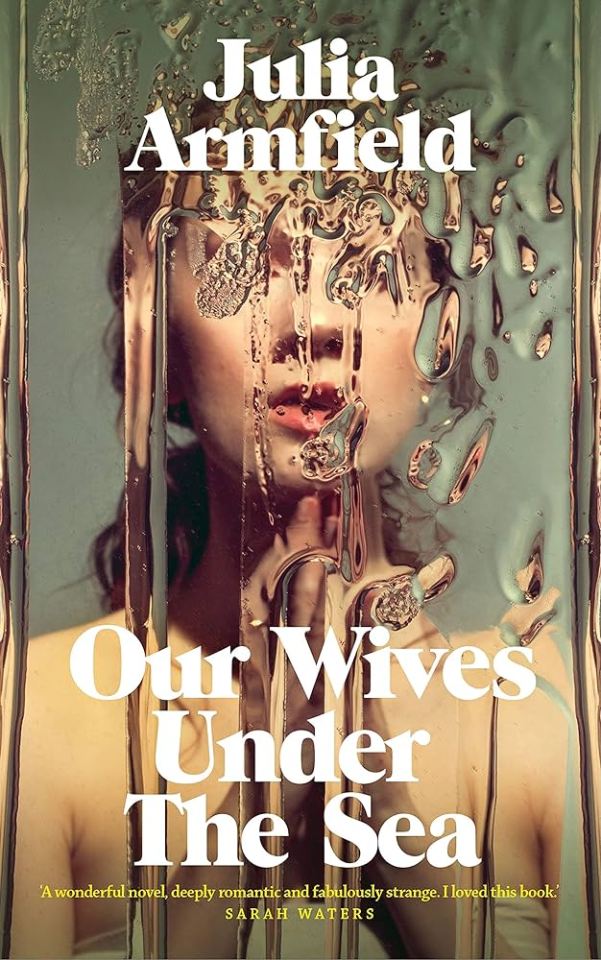
Our Wives Under the Sea by Julia Armfield
This book follows Miri, whose wife goes missing on a deep-sea submarine mission for six months. Miri thought her wife dead, but she miraculously returns one day...but her wife has changed. She's like a stranger. She may have bought the horrors of the sea home with her.
This is a gripping exploration of grief and loss combined with a delicious, slow horror that creeps under your skin. There's excellent Lovecraftian and body horror elements to the novel, but it works very effectively as a metaphor for a loved one going through trauma, and a relationship starting to crumble because everything seems different. A moment that really stuck out to me is when Miri copes with her wife's disappearance by frequenting an online community where women roleplay as wives with husbands missing in space. The way the online drama of the community interacted with her grief was both funny and heartbreaking.
This is another example of a book that makes me deeply jealous with its lyrical writing, and another one for the ever-lengthening all time favorites list.
Otherside Picnic Volume 8: Accomplices No More by Iori Miyazawa
The latest entry in a series about two girls exploring an alternate dimension full of creepypasta monsters, while also falling in love with each other. See my other reviews here and here.
This volume has the payoff to a lot of careful character work and relationship building, and it was completely satisfying. In fact, it was...show-stopping. Spectacular. Incredible. I loved the exploration of how love, sex, and romance are so different for different people and it's impossible to put it in neat boxes. The frank and messy conversation our leads have about their relationship was perfect and so was that absolutely bonkers, wonderful finale. This is another one for the all times favorite list, and I loved it so much I wrote a extremely long review/recap here.
Queer Ducks (and Other Animals): The Natural World of Animal Sexuality by Eliot Schrefer
This was a well-researched, well-crafted, easy to read book that explores queerness (mainly homosexuality, bisexuality, trans and genderfluid expressions in animals, and even the question of if and how animals can related to gender) in the animal kingdom. Though it's definitely aimed at teens, I learned a lot from it (who knew female bonobos were such life goals) and it presented its information in a fun way. It included some interesting examinations of how proof of homosexuality and bisexuality in animals was historically suppressed and filtered through homophobic assumptions. If you want to learn a little animal science in an accessible format, definitely check this out.
Night’s Edge by Liz Kerin
The story follows Mia, a woman in her 20's living with her vampire mother. Her whole life revolves around not drawing suspicion towards her Mom. She also has to make sure to feed her Mom some of her blood every night--lest her mother fall back in with her abusive boyfriend and start hunting humans. But when Mia meets a cute girl, she starts to dream of living her own life...
It was a really interesting use of vampirism as a metaphor for both living with a parent struggling with addiction and having an abusive parent. It's just a well-told, heartwrenching tale that got deep into the character's mindsets. I thought the ending was bit abrupt and rushed, but it did make more sense once I realized this was the first in a duology. It's a fascinating take on vampires, and I'm interested in seeing more.
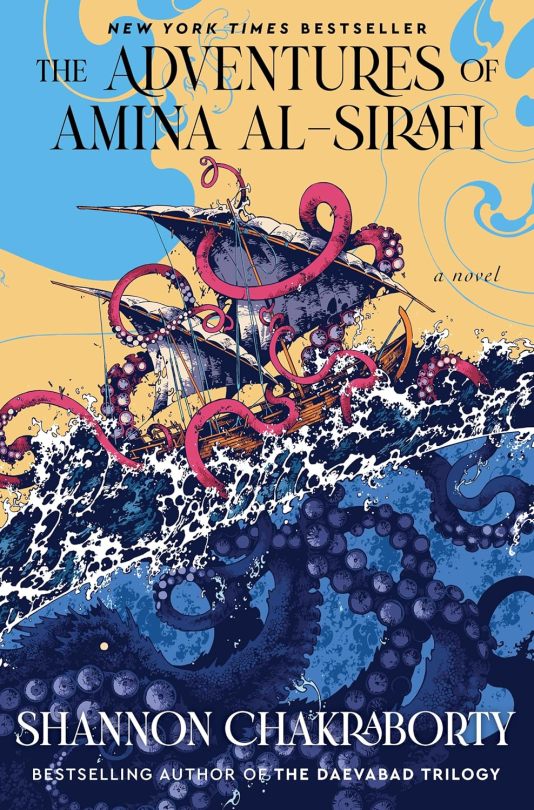
The Adventures of Amina al-Sirafi by Shannon Chakraborty
This novel follows a middle-aged Muslim female pirate living around the Arabian Peninsula. She's supposed to be in retirement, but wouldn't you know it, she's lured in for one last job! I she rescues a kidnapped girl, she'll have all the riches she needs to set her family up for life. So Amina begins her adventure of fighting demons and monsters and ex-husbands. But the job might not be all it seems.
This novel is full of all the entertaining swashbuckling action and shenanigans that any pirate story should have. It's a rollicking good time, and feeds my craving for middle aged women going on quests and kicking ass. Amina's journey is a fun, wild ride full of dynamic characters and interesting mythology!
Yellowface by R.F. Kuang
Juniper is friends with a successful Chinese-American author, Athena Liu, and has always been deeply jealous of her. When Athena dies in front of her, Juniper decides to steal her manuscript rooted in Chinese history and claim it as her own. But plagiarism might catch up with her...
This is a strong example of a book I thought was really well-done, but one I'm probably never going to read again. The way it depicted Twitter drama is just too accurate and I got anxiety. It did such a good job putting you in Juniper's awful shoes so you can feel the pressure close in along with her. The book's commentary on the insidious racism of the publishing industry was effective, and it made a horrible character's journey fascinating to follow. I was so intrigued yet anxious I had to force myself to finish the last few pages.
Bonus read:
Legends and Lattes by Travis Baldtree
A very cute novel about an orc named Viv who decides to retire from the violent life of a bounty hunter and run a coffee shop instead. She ends up getting a lot of assistance from a succubus named Tandri...and my, is that a slow-burn coffee shop romance brewing? This book reminds me a lot of various cozy slice-of-life anime, and it's nice to be getting more of that feeling in book form. I wish there was a little more specific to the fantasy world rather than making it a coffee shop that line up 1 to 1 to a modern day shop, but it was definitely a sweet read.
#year in books#my reviews#our wives under the sea#in the dream house#zachary ying and the dragon emperor#camp damascus#qualia the purple#otherside picnic#queer ducks#night's edge#legends and lattes#the adventures of amina al sirafi#books#queer lit#yellowface#r.f. kuang#xiran jay zhao#carmen maria machado
194 notes
·
View notes
Text
house as character trope i love you. house as gaping wound in the maw of creation trope i love you. house as caretaker and house as abuser and house as dog that bites the hand that feeds it i love you. house as safety perverted i love you. house as starving and hungry and desperate for attention i love you i love you i lo
#horror#house as character#the september house#in the dream house#the haunting of hill house#we have always lived in the castle#the deep#even#the locked tomb#canaan house#yeah
215 notes
·
View notes
Note
sorry if you have already answered this, but are we getting any queer rep in Long Live Evil? 💕 i am super excited to see what you've cooked up for us either way!
I came back after I'd gone off on one, seeing the post had struck a chord and being thankful but fearful of my inbox. Let me say with delighted surprise that all the asks are very kind.
Thank you for this one, sweet anon. I am so excited and so nervous about my best beloved, Long Live Evil, and about coming back with a new book of my own after so long, when I believed for a long time it was hopeless.
I'm really grateful to find readers waiting for me. But I know readers are naturally more invested in characters they know: I extremely appreciate you taking an interest in the future.
So, short answer: YEAH you are!
Long answer: Long Live Evil wouldn't exist without its queer narratives.
C.S. Pacat and I were talking in our virtual Brookline Booksmith event recently about our favourite Disney villains. C.S. Pacat picked Maleficent, a fine choice. I picked Snow White's Evil Queen. We agreed we loved most of them.
Here's the relevant excerpt I was quoting in my last post from Carmen Maria Machado's In The Dream House, saying 'I think a lot about queer villains, the problem and pleasure and audacity of them.' Well... me too.
I think many of us have experienced feeling made wrong in some way - for not wanting what society said we should or being what we were expected to be - and that one step along that journey of discovery is going 'Okay, if it's wicked, I'll just BE wicked.' And that's part of why those characters appeal - because they seem free, and free of pain.
But modern storytelling isn't confined to coding, and audiences can now feel free to expect, not the certainty, but the possibility characters who aren't introduced as such still might actually turn out to be LGBT+. The essays I've read about Supernatural, Teen Wolf, Sherlock, Ted Lasso, Fox 9-1-1... I think the latest argued Jaime Lannister was bisexual. (Pretty persuasive.)
I remember reading the Raven Cycle going 'oh? OH.' I remember being at a writing retreat in 2013 and running through the halls screaming about Nico diAngelo. Ten years later we got a Nico diAngelo book co-written by Rick Riordan and the amazing Mark Oshiro. I watched Red, White and Royal Blue with a friend and she said 'honestly I hope the guys get together, but...' and I (having read the book) silenced myself with a herculean effort and watched her hopes come true. I didn't know about The Seven Husbands of Evelyn Hugo and almost dropped the book in a swimming pool. But I've also read and watched many things thinking, just maybe... oh, no. Still that hope existing is meaningful, the thought that if the story had gone differently, if this revelation had happened, if this realisation had happened, if, if, if...
Long Live Evil is a story about the story going differently and asking yourself questions about your own nature, and the escape to fiction of those who really need escape. The book is based on that 'if,' and the 'if' itself is joyous, and brings me back to the idea of gleefully transgressing the narrative that much villain love is based on.
It's also an ensemble story with a rogue's gallery of characters and multiple PoVs. (I was much inspired by the Six of Crows ensemble.) So it isn't about any one character's romance, and by the book's nature there exist many possibilities. A critique partner read and said 'I didn't know you were going THERE' and I responded 'Should I?'
I've never been one to confirm where stories are going, and I won't do so now. I'm not talking about any one character or telling you a direction.
I'm just saying yes to rep. It's baked in.
#long live evil#supernatural#teen wolf#fox 911#lgbt reads#six of crows#evil queen#maleficent#red white and royal blue#the raven cycle#in the dream house#cs pacat#percy jackson
123 notes
·
View notes
Text
"We deserve to have our wrongdoing represented as much as our heroism, because when we refuse wrongdoing as a possibility for a group of people, we refuse their humanity.”
Carmen Maria Machado “In the Dream House”
#aesthetic#dark academia#academia#books and reading#books#book quotes#dark academia quotes#bookblr#relatable#booklover#Carmen Maria Machado#In the Dream House#representation#humanity#heroism#wrongdoing
21 notes
·
View notes
Text
“she kisses your top lip, then the lower one, like each one deserves its own tender attention. she leans away and looks at you with the kind of slow, reverent consideration you’d give to a painting. she strokes the soft inside of your wrist. you feel your heart beating somewhere far away, as if it’s behind glass. ‘i can’t believe that you've chosen me,’ she says.”
— carmen maria machado, in the dream house
20 notes
·
View notes
Text


One of the scariest books I’ve ever read but that came to me when I needed it most. Thank you Carmen; I hope you’re doing better.
#english major#herecomesoberon#english#literature#current read#books#carmen maria machado#in the dream house#horror
159 notes
·
View notes
Note
Could you pls do a web weaving of growing up not feeling beautiful bc no one ever told you so? 🤡🧍♀️Thank youuu



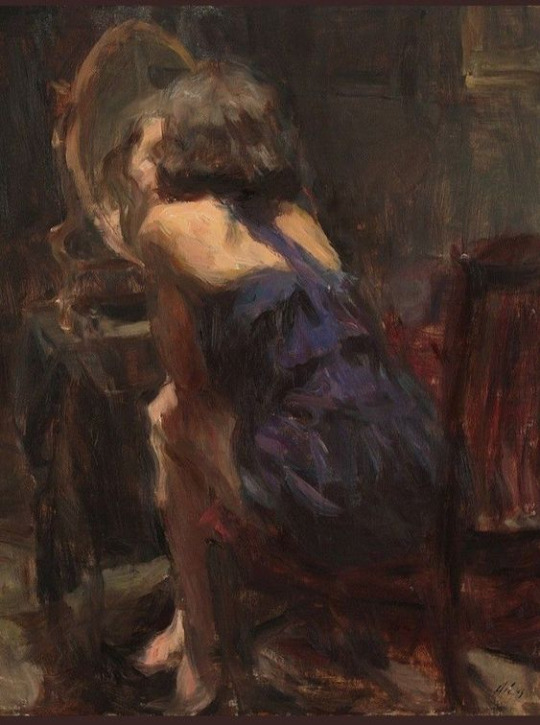


this one was really hard ngl but i hope this is what you were looking for !!
Doris Day Que Sera Sera / Anne Sexton A Self-Portrait in Letters / unknown / Ron Hicks / pinterest / Carmen Maria Machado In the Dream House
#on growing up#on loneliness#web weave#poetry compilation#doris day#que sera sera#anne sexton#a self portrait in letters#ron hicks#carmen maria machado#in the dream house#words#spilled poetry#spilled thoughts#spilled ink#poem#dark academia#dark academia poetry#poetry#dark academia quote#writing
251 notes
·
View notes
Text
A narrative needs two things to be a gothic romance. First, "woman plus habitation." "Horror," film theorist Mary Ann Doane writes, "which should by rights be external to domesticity, infiltrates the home." The house is not essential for domestic abuse, but hell, it helps: a private space where private dramas are enacted behind, as the cliche goes, closed doors; but also windows sealed against the sound, drawn curtains, silent phones. A house is never apolitical. it is conceived, constructed, occupied, and policed by people with power, needs, and fears. Windex is political. So is the incense you burn to hide the smell of sex, or a fight. The second necessary element: "marrying a stranger." Strangers, feminist film theorist Diane Waldman points out, because during the 1940s--the heyday of gothic romance films like Rebecca and Dragonwyck and Suspicion--men were returning from war, no longer familiar to the people they'd left behind. "The rash of hasty pre-war marriages (and the subsequent all-time high divorce rate of 1946), the increase in early marriages in the 40s," Waldman writes, "and the process of wartime separation and reunion [gave the] motif of the Gothics a specific historical resonance." "The gothic heroine," film scholar Tania Modleski says, "tries to convince herself that her suspicions are unfounded, that, since she loves him, he must be trustworthy and that she will have failed as a woman if she does not implicitly believe in him." There is of course a major problem with the gothic: it is by nature heteronormative. A notable exception is Joseph Sheridan Le Fanu's Carmilla, with its powerful queer undertones between the innocent protagonist and the sinister, titular vampire. ("You will think me cruel, very selfish, but love is always selfish," Carmilla tells Laura. "How jealous I am you cannot know. You must come with me, loving me, to death; or else hate me and still come with me, and hating me through death and after.") We were not married; she was not a dark and brooding man. It was hardly a crumbling ancestral manor; just a single-family home, built at the beginning of the Great Depression. No moors, just a golf course. But it was a "woman plus habitation" and she was a stranger. That is probably the truest and most gothic part; not because of war or because we'd only met with chaperones before marriage; rahter because i didn't know her, not really, until I did. She was a stranger because something essential was shielded, released in tiny bursts until it became a flood--a flood of what i realized I did not know.(19) Afterward, I would mourn her as if she'd died, because something had: someone we had created together. (19). Thompson, Motif-Index of Folk-literature, Type T11, Falling in love with a person never seen.
“Dream House as American Gothic”, In The Dream House: A Memoir by Carmen Maria Machado (2019, Gray Wolf Press)
#carmen maria machado#in the dream house#abuse#trauma#being a haunting#the gothic#reading log#lgbt literature
29 notes
·
View notes